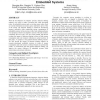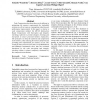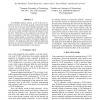154 search results - page 2 / 31 » Impact of Code Compression on the Power Consumption in Embed... |
SAC
2009
ACM
14 years 2 months ago
2009
ACM
With the development of computer systems, function inlining schemes were used to reduce execution time while increasing codes. In embedded systems such as wireless sensor nodes, t...
RECOSOC
2007
13 years 10 months ago
2007
Code Compression has been shown to be efficient in minimizing the memory requirements for embedded systems as well as in power consumption reduction and performance improvement. I...
IWSOC
2003
IEEE
14 years 2 months ago
2003
IEEE
In embedded systems, memory is one of the most expensive resources. Due to this, program code size has turned out to be one of the most critical design constraints. Code compressi...
RTCSA
2005
IEEE
14 years 2 months ago
2005
IEEE
The run-time power consumption model for multimedia application routines in an embedded system is developed in this work. A wide range of benchmarks for these routines such as ima...
IPPS
2007
IEEE
14 years 3 months ago
2007
IEEE
Code compression has been applied to embedded systems to minimize the silicon area utilized for program memories, and lower the power consumption. More recently, it has become a n...



